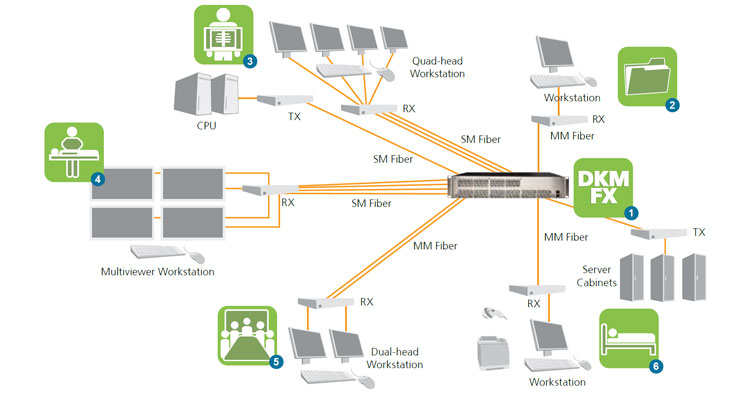Navigation |
HealthcareCase Study: Medical centre with MRI
Sending high-definition images over long distances to multiple usersThe backgroundMagnetic Resonance Imaging (MRI) is an advanced method to detect pathological changes in the organs inside the body. It uses magnetic fields and radio waves to create detailed high-quality images of individual organs, joints, and tissues. MRI scanners provide different view angles and, in certain cases, can present much better location, extent, and cause of disease compared to conventional methods like X-rays or ultrasound. At a Medical Center, images from MRI machines need to be provided to a number of different stations for diagnosis and surgical preparation. Instead of the usual prints, these images will be distributed electronically to the radiologists, surgeons, and meeting and operating rooms, along with the electronic patient records. The requirementsThe most important factor for the medical center was a pixelperfect reproduction of the images at all locations because pixel loss could lead to misdiagnosis. Since the hospital campus is quite large, the images must be sent over long distances of up to more than one kilometer. In addition, electromagnetic and RF interferences (EMI/RFI) could affect the electronic transmission and cause a loss of image quality. In total, the new distribution system needed to include four servers providing the images to a total of 22 stations distributed on the campus. Besides the images, keyboard and mouse signals of the user consoles also needed to be extended to allow staff to add notes to the patient files. The solutionThe required long distance and the environment with high interferences lead to a solution that uses fiber-optic cable as transmission media. Fiber optics technology is based on light pulses and is completely immune to all EMI/RFI interference. In addition, blackbox.eu fiber optics allows much greater distances than a CATx infrastructure, without loss of the signal quality. To distribute the images and peripheral data, Black Box suggested the DKM FX Compact Matrix Switch with 32 fiber SFP as the central switch. The DKM FX gives reliable access to high-quality, real-time digital video and a whole host of peripherals across the campus. It routes DisplayPort 1.1 resolutions up to RGB 3:3:3 and HDMI or DVI resolutions with Full HD 1080p. The distributed locations are connected through the DKM FX Modular Extenders that provide the necessary interfaces and signal extension depending on the individual location. Four operating rooms, each equipped with four large HDMI displays, receive the required images through extenders with quad-head video in a pixelperfect quality. Additional keyboard and mouse access allows the team to protocol the operation process. Two meeting rooms receive all required data from the image and patient data servers. Dual-head DKM FX HDMI Extenders give full USB-keyboard/mouse control and display the images on two 40" LCD displays. For patient stations and the patient data archive, the extenders provide high-quality images and USB-keyboard and mouse control as well as USB 2.0 extension for barcode readers and printer access. The medical center is impressed by the high quality of the diagnostic images and the future-proof design of the DKM FXC system. The DKM FX switch leaves room for future expansion via the unused ports or the cascading option. Dual power supplies provide the necessary, reliable 24/7 availability of the system. And the modular DKM FX Extenders can be adapted to future requirements just by replacing the existing cards if new or changed interfaces or additional video channels and video formats or peripherals are required. 
Application Diagram1. DKM FX Compact Matrix Switch, Fiber, 32 PortsThe DKM FX switch provides transparent switching and connections to the DKM FX transmitters and receivers over multimode or single-mode fiber. 2. Administration and ArchiveUser console with a single HDMI screen, USB keyboard, and mouse are connected through a DKM Compact FX Receiver to the central DKM FX compact switch using one multimode fiber string. 3. Diagnostic ImagingFour HDMI screens, USB keyboard, and mouse are connected through a Modular DKM FX 4-Port Receiver to the central DKM FX switch using four single-mode fiber strings. Two image servers are connected through a modular DKM FX 2-Port Transmitter to the central DKM FX switch using two single-mode fiber strings. 4. Operating RoomsFour HDMI screens, USB keyboard, and mouse are connected through a Modular DKM FX 4-Port Receiver to the central DKM FX switch using four single-mode fiber strings. 5. Meeting RoomsForty-inch HDMI screens, USB keyboard, and mouse are connected through a Modular DKM FX 2-Port Receiver to the central DKM FX switch using two multimode fiber strings. 6. Hospital WardsUser console with a single HDMI screen, keyboard, and mouse and additional USB peripherals (barcode scanner and printer) are connected through a Compact FX Receiver to the central DKM FX switch using one multimode fiber string. Patient data servers are each connected to the central system through a Compact DKM Transmitter using one multimode fiber cable. |